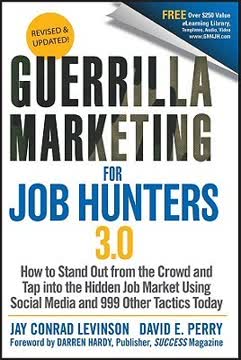Key Takeaways
1. The Job Market Has Fundamentally Changed: Adapt or Be Left Behind
The current “jobless” recovery is a consequence of the economy’s rapid evolution from a natural resources- and manufacturing-based economy to a knowledge-based one.
New Economic Reality. The job market is no longer cyclical; it's undergoing a profound transformation from resource- and manufacturing-based to knowledge-based. Many jobs have disappeared permanently, replaced by global outsourcing and a demand for new skills. This means traditional job-hunting methods are largely insufficient.
Hidden Opportunities. Over 95% of jobs are never advertised, as employers are overwhelmed by resumes and prefer to proactively source candidates. Millions are hired annually, but these opportunities remain invisible to ordinary job seekers. You must understand how employers find talent to be discovered.
Continuous Evolution. Job growth now depends on creating new positions, requiring a longer rebound time. All jobs are temporary in this new economy, necessitating a constant readiness for the next opportunity. The most adaptable, not necessarily the strongest or most intelligent, will survive and thrive.
2. Adopt a Guerrilla Mindset: Proactive, Unconventional, and Results-Driven
Guerrillas pursue conventional goals in unconventional ways.
Action-Oriented Approach. A Guerrilla mindset means taking charge of your job hunt, embracing action, and viewing setbacks as temporary. It's about being a "doer" and a "go-getter" who creates solutions, not just seeks a paycheck. This proactive stance differentiates you from the passive majority.
The Two Secrets. Success hinges on two core principles: having a clear, detailed plan and demonstrating that you are worth far more to an employer (value) than you cost (salary and benefits). This value-driven approach transforms you from a supplicant to a blue-chip investment.
Resilience and Focus. Job hunting is tough, filled with rejection and silence. Cultivate a tough, positive mindset by surrounding yourself with supportive people, tracking your progress visually, and using positive self-talk. Persistence and an attitude of continuous improvement are paramount.
3. Craft Your Personal Brand: Sell Your Value, Not Just Your Skills
Personal branding is not about projecting a false image. It is about understanding what is unique about you—your accomplishments, experience, attitude—and using that to differentiate yourself from other job hunters.
Beyond Qualifications. Employers seek candidates who are leaders, excellent communicators, action-oriented, passionate, and culturally compatible. Being merely "great at your job" is no longer enough; you must brand yourself as a "you-can't-do-without-me" solution. Your brand is your edge, reflecting your unique value.
"You Inc." Think of yourself as a company, "You Inc.," where value is derived from your knowledge, aptitude, and ability to create new intellectual wealth. Employers are looking for individuals who can "explode outward from an open-ended initiative-driven space and create value." This means articulating your worth beyond job titles.
Prove Your Claims. Identify your most marketable skills by listing what you do well and enjoy. Then, for each skill, document at least three specific, quantifiable achievements (figures, dates, percentages) that prove your claims. This data will form the foundation of your marketing materials, turning you into a walking, talking, blue-chip stock.
4. Strategic Research is Your Competitive Edge: Uncover Hidden Opportunities
Research is a Guerrilla’s competitive edge.
Beyond the Obvious. Most job hunters stop at company websites, but Guerrillas dig deeper. Research former employees' resumes, social media accounts, articles, blogs, and industry newsletters to uncover competitive intelligence. This allows you to understand an industry, locate companies of interest, and identify hiring managers.
Cracking the Hidden Market. The "hidden job market" isn't truly hidden; it's simply unadvertised. Access it by targeting competitors, leveraging industry associations, and performing structured internet searches. Tools like Hoover's, Edgar Online, and America's Career InfoNet provide invaluable insights into company growth, financials, and strategic challenges.
Finding Decision-Makers. Use Google's advanced search, ZoomInfo, and direct phone calls to identify the specific individuals who can hire you. Research their backgrounds, interests, and any public mentions to tailor your approach. Librarians are also invaluable allies in this quest for information.
5. Your Resume and Cover Letter Are Marketing Tools: Compel Action, Don't Just List History
Your resume is a marketing tool. It must compel its reader to pick up the phone and call you.
Beyond Generic. Your resume is not a historical document; it's a laser-guided missile designed to address specific employer needs. Avoid laundry lists of responsibilities; instead, highlight relevant accomplishments and quantifiable results. The goal is to make your resume so compelling that it forces the reader to call you.
The Guerrilla Resume. This resume, whether Standard or Extreme, is one page and features a focused objective/summary, select accomplishments/skills, and a concise experience section. The Extreme version adds a mandatory "Proof section" (logos, testimonials) and optional "Grabber" and "Career Driver" statements to aggressively differentiate you.
The Only Cover Letter You Need. Your cover letter is a personal sales letter, not a generic form. Address it to the hiring manager by name, immediately state what's in it for them, and provide compelling, quantifiable successes. Conclude by stating when you will call to schedule a meeting, demonstrating initiative and confidence.
6. Leverage Social Media: Be Found and Build a Powerful Network
It’s more important to be found than to find.
LinkedIn: The 800-Pound Gorilla. LinkedIn is the epicenter of your online professional presence. Optimize your profile with SEO keywords, specific qualifications, affiliations, and a professional photo. Actively seek recommendations, as they serve as powerful "digital breadcrumbs" for recruiters.
Beyond LinkedIn. While LinkedIn is primary, other platforms like Facebook and Twitter are also used by recruiters. Ensure consistent messaging across all your online profiles. Use tools like BranchOut (Facebook add-on) and Twitter Grader to expand your network and identify power brokers.
Digital Breadcrumbs. Make yourself "Zoomable" on ZoomInfo and other online directories. Create a personal eResume, blog, or web portfolio to showcase your work and expertise. These online assets act as passive recruiting tools, making it easy for employers to find you and offer opportunities.
7. Employ Commando Tactics: Stand Out and Get Direct Access
Those who say it cannot be done shouldn’t interrupt the people doing it.
Unconventional Engagement. To cut through the noise, employ creative, bold, and tasteful tactics. Examples include the "Coffee Cup Caper" (sending a coffee cup with your resume and a meeting request), writing a white paper on a hot industry topic, or sending a "Trojan Thank-You Note" with your resume.
Direct Marketing. Instead of waiting, proactively reach out. Send half your resume to pique curiosity, or a letter stating you're "overqualified" but offering unique value. Use e-mail chain letters (with caution) to leverage your network for referrals to target companies.
Showcase Expertise. Become an industry expert by writing newsletters, case studies, or competitive analyses for target companies. Consider "temp-to-perm" roles or even "auditioning" with a video resume or a project demonstrating your skills. These tactics position you as a solution-provider, not just a job seeker.
8. Master the Interview: Focus on Employer Needs and Prove Your Value
Your mission is to neutralize the employer’s concerns by eliminating fear, doubt, and uncertainty.
Tailored Strategy. Understand that different decision-makers (senior executives, hiring managers, HR, corporate recruiters) have distinct agendas. Tailor your message to their specific concerns, focusing on how your accomplishments translate into success for them. Aim to start your job hunting in the executive suite to bypass hurdles.
Preparation is Key. Complete a T-account exercise, mapping your skills to the employer's needs. Build a "storybook" of relevant accomplishments, delivered in a conversational tone, to make your candidacy memorable. Rehearse your answers to common behavioral interview questions, especially regarding strengths and weaknesses, demonstrating follow-through.
Take Charge. During the interview, project confidence and enthusiasm. Ask insightful questions that demonstrate your research and understanding of their business challenges. Use "killer questions" to uncover their deepest concerns and then map your solutions directly to those problems, turning the interview into a business discussion where they start selling you.
9. Negotiate from Strength: Understand Your Full Compensation Package
Leverage is having something the other guy wants. Or better yet, needs. Or best of all, simply can’t do without.
Beyond Salary. Negotiations are relationship-driven, not transactional. Approach them with detached enthusiasm and a willingness to walk away. Research your bottom-line salary and the full market value of your position, including benefits like tuition forgiveness, professional development, and allowances.
Negotiate Power First. Prioritize negotiating your responsibilities and authority before discussing compensation. Document any increased duties, as this justifies a higher pay packet. This strategy ensures the employer's initial offer is already inflated and closer to your desired level.
Control the Process. If an offer comes through a recruiter, use them as a sounding board. If asked about salary expectations, defer the conversation until a mutual fit is established, stating, "I'm certain you'll be fair." This brands you as confident and forces them to the bargaining table on your terms.
10. Maintain a "Career Lancing" Mindset: Always Be Ready for the Next Opportunity
You will never again be dependent on anyone but yourself.
Continuous Self-Marketing. In the new economy, all jobs are temporary. Adopt a "career lancing" mindset, meaning you are always managing your career as a professional services provider. This involves continuously branding yourself, increasing your value, and building a rewarding career, even when currently employed.
Proactive Future-Proofing. Regularly update your skills, network, and online presence. By consistently demonstrating your expertise and value, you ensure that new opportunities will always come knocking. This proactive approach insulates you from market volatility and keeps you in demand.
Empowerment and Independence. The ultimate goal of Guerrilla Marketing for Job Hunters is to empower you to control your own career destiny. By mastering these unconventional strategies, you gain the confidence and tools to navigate any job market, ensuring you are never dependent on external circumstances for your professional success.
Last updated:
Review Summary
Guerrilla Marketing for Job Hunters 3.0 receives mostly positive reviews for its unconventional job search strategies. Readers appreciate the practical advice on personal branding, networking, and leveraging digital tools. Many find the tactics creative and effective, especially for experienced professionals. Some criticize its focus on corporate jobs and the overwhelming amount of information. While not all suggestions resonate with everyone, most readers find valuable insights to enhance their job search, particularly in competitive markets.
Similar Books










